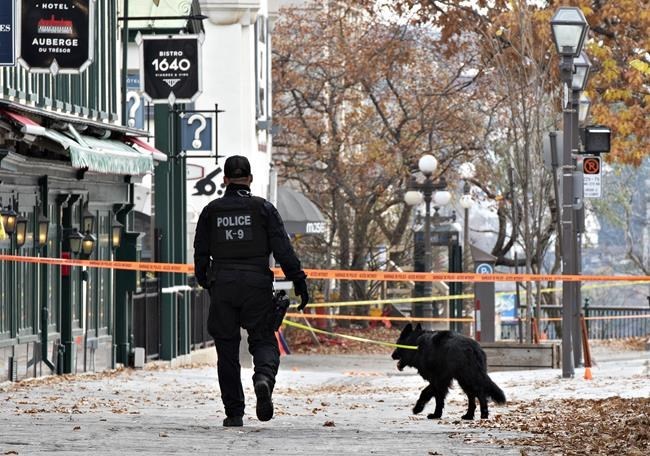QUEBEC — The accused in the 2020 Halloween night sword killings in Quebec City was not suffering from psychosis or schizophrenia but was on a "narcissistic quest" and knew right from wrong, a psychiatrist testified for the Crown Thursday.
Dr. Sylvain Faucher told the jury that Carl Girouard was suffering from a narcissistic personality disorder that fuelled the attack that night, with the ultimate goal of feeding his self-esteem.
“He is on a narcissistic quest, a way to express all his resentment toward society that rejected him because he didn’t correspond to its standards,” Faucher said.
Girouard, 26, faces two counts of first-degree murder in the Oct. 31, 2020, deaths of François Duchesne, 56, and Suzanne Clermont, 61, as well as five counts of attempted murder. He has admitted to the attacks, but his defence maintains he was not criminally responsible because he suffered from a mental disorder.
A defence expert testified earlier that Girouard was likely schizophrenic and in a state of psychosis the night of the killings. The psychiatrist, Dr. Gilles Chamberland, said Girouard suffered from delusions and could not tell right from wrong.
The Crown contends that Girouard was well aware of his actions and had planned his attack as early as 2014, a position supported by Faucher's testimony Thursday.
The psychiatrist said Girouard isn't a flamboyant narcissist but rather one who is hypervigilant and sensitive to the opinion of others and trying to protect his self-esteem.
Girouard has described his actions to the court as a "mission" but Faucher said the killer was pursuing a "malicious fantasy" inspired by his imagination and the violent video games he played. His goal was notoriety, the expert testified.
He also noted in the accused obsessive compulsive disorder and a personality disorder that led him to feel inadequate, along with heavy cannabis use and a video game dependency.
Faucher said it was highly unlikely the accused was suffering from schizophrenia, citing numerous factors, including the absence of symptoms at a younger age that typically suggest the arrival of the disease. Notably, references to the mission and his alter ego "Bad Carl," whom he blamed for the attack, vanished right after his arrest without the help of any medications.
Faucher also doesn't believe the accused was suffering from psychosis, noting the delusions that are a key element to psychosis are not static and evolve over time. “It’s usually something that would appear gradually, insidiously and would have stayed there … whether they had plenty of positive symptoms or are in remission,” Faucher said.
The Crown expert met with the accused twice in March 2022 and recommended Girouard be seen by a neuropsychologist to determine whether a mental disease was involved. The neuropsychologist came to similar conclusions in testimony this week, saying Girouard was narcissistic and not psychotic the night of the stabbings.
Faucher is the final witness to be heard by the 11-member jury that will decide Girouard's fate. He will be cross-examined by Girouard's lawyer on Friday.
This report by The Canadian Press was first published May 5, 2022.
— By Sidhartha Banerjee in Montreal
The Canadian Press



